 |
Wertham's Ghost
Posted:
February
5, 2002; Revised: April 19, 2006
As fans know, the Dick/Barbara romance ended in TNBA’s "Old Wounds." We still see sparks, as when Barbara pines for Dick in "You Scratch My Back." Dick refuses to let her back into his life. He feels betrayed. Indeed, Dick may not be wrong to push her away. For the rest of her career Batgirl consistently patrols with Batman instead of him. She is doing the very thing that makes Dick not trust her. He told her plainly and she does it anyway. Why should he take her back if he’s only going to get hurt again?
Then the Batman Beyond animated series is created, and with it a distant-future character we’ll call Barbara Beyond. The love of Dick’s life, she dismisses their years together as "puppy love." This is akin to saying that Dick’s broken heart is his own fault, and that Bruce and Barbara’s sickening behavior after his departure is also his fault. It most certainly is not. To say that Barbara consoled herself for a lost love by making fun of him and having an affair with his father mocks and degrades them all. Many families drive a son away; do they console each other in this fashion? Of course not.
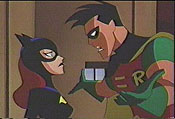 This
proposal redraws the psychological landscape of the Bat mythos. Barbara
used to be the most normal of the B:TAS vigilantes. But if she’d
rather smooch her boyfriend’s father, and escort a rich man twice
her age into his dotage, that makes Dick the most normal one in the family.
This
proposal redraws the psychological landscape of the Bat mythos. Barbara
used to be the most normal of the B:TAS vigilantes. But if she’d
rather smooch her boyfriend’s father, and escort a rich man twice
her age into his dotage, that makes Dick the most normal one in the family.
Popular opinion is that Nightwing never appeared in Batman Beyond because he and Wayne are fighting. Possibly. Dick and Bruce Wayne fight the way they breathe, naturally and constantly. It’s just as likely that Nightwing avoids Gotham because he’s still furious at Barbara. Even Old Man Wayne had enough sense to regret things. But to this day Barbara doesn’t think she did anything wrong.
Holmes speaks of "grief staining backwards," draining color and joy from memory, but perversion stains backwards too. Barbara Beyond is called upon to service not one but two men from the same family. It’s not beautiful. It’s not nostalgic. It’s just sleazy, and only raises that old ghost with its assumptions of A Partner’s Place. Once again the woman’s romances become the primary purpose for her character. Of course she would service as many men as possible – that’s her job – and the one she cannot service physically (Tim Drake Beyond) she nurtures in other ways. It didn’t help that Barbara Beyond contributed far less to the BB series than fans had anticipated. Her character development reminds one of an exchange in the series Home Improvement:
Randy : "Dinner and flowers? What'd you do now, Dad?"
Tim : "Nothing! See, the thing about marriage is, every now and then I do nice stuff for Mom even when I don't have to. That way I build up credit against bad stuff I haven't done yet."
Randy : "So it's like frequent screw-up miles."
As a young woman Barbara/Batgirl earned a balance of goodwill by fighting crime. Barbara Beyond drew heavily upon that account while making few new deposits to it. For many fans the it’s-not-legally-incest proposal has overdrawn that account. Fans wanted to see the character do something, well, good. True, whenever Terry (the Batman of this future) caught crooks she put them in jail, but any chief of police could have done the same. Why did the only thing about Barbara Beyond that made her unique, that gave her distinction, have to be something bad?
Robin had at his disposal the aggressive Bat-Girl (Betty), Batgirl I (Barbara), and Batgirl II (Huntress), each more sexually explicit than the last. Now we are told that the Batman also had easy access to Batgirl I. Does this mean the men finally find their female partners attractive? No. They find them available, and that’s no compliment.
"The very notion that every lady would yield, if she didn't have a compelling reason not to, is insulting." --Judith Martin
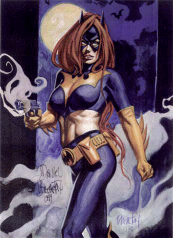 What
the women of Batman do is to legitimize another of Wertham’s
points, twice over. One: that the Bat mythos is hypersexualized and therefore
a bad place for good women. Or is that a good place for bad women? Two:
that its women cannot handle power. They become intoxicated, then addicted.
They make bizarre and obvious mistakes but their addiction blinds them
to reality. Eventually they are crushed beneath the weight of cumulative
mistakes, or else they commit one piercing, unforgettable sin that turns
the audience against them in unison. The character is then discarded and
her fatal flaws recycled in the next generation.
What
the women of Batman do is to legitimize another of Wertham’s
points, twice over. One: that the Bat mythos is hypersexualized and therefore
a bad place for good women. Or is that a good place for bad women? Two:
that its women cannot handle power. They become intoxicated, then addicted.
They make bizarre and obvious mistakes but their addiction blinds them
to reality. Eventually they are crushed beneath the weight of cumulative
mistakes, or else they commit one piercing, unforgettable sin that turns
the audience against them in unison. The character is then discarded and
her fatal flaws recycled in the next generation.
Wertham accused Batman of an anti-woman bias that did not yet exist. He declared the Batman to be explicitly sexual, and did so in a way that could only contaminate Batman’s home. At the time, these charges were absurd. Since then the Bat mythos has done the very thing it was falsely accused of doing – and it made these mistakes trying to prove Wertham wrong. It has become a self-fulfilling prophecy. Today the comic continuity has yet another Batgirl, Batgirl III. However the name she received at random fits Dr. Wertham better: "Cassandra."
The possible future known as Batman Beyond stands in a unique position in the Bat mythos. The mistakes of the past did not have to be repeated, yet for the female characters it happened anyway. For the men, though, the BB series suggested an opportunity not only to avoid the mistakes of the past but to rectify them.
Batman Beyond television series was set in the 2040s, but its theme was the closest the mythos has come to Year One in a long time. Terry McGinnis shared Old Man Wayne’s goal : that what happened to them must never happen to anyone else. Together the two men are Batman, accomplishing what neither could alone.
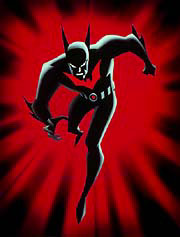 Terry’s
arrival brought Batman back to his origins. Why does someone become Batman?
What alternate paths were available, and why did the hero reject them?
What sacrifices must he make? Are they worth it?
Terry’s
arrival brought Batman back to his origins. Why does someone become Batman?
What alternate paths were available, and why did the hero reject them?
What sacrifices must he make? Are they worth it?
Lamentably, this promising series became bogged down by peripheral characters leading small lives. The primary characters wilted. Among these primary characters were the trio who comprised Terry’s loved ones. Very soon these three were called upon to justify their existence or get off the screen. If Dana Tan and Mary and Matt McGinnis had the power to advance and develop the Terry character, why did they fail to do so?
The only plausible answer is that Wertham’s ghost has extended his reach across 50 years of time and space to influence the casting of this series. Terry is saddled with a possessive girlfriend and required to live with his mommy. It is as though their sole purpose was to ensure that Terry and Bruce Wayne don’t fall victim to the old rumors.
Of course it does no good to bar the door and leave the burglar the gift of an open window. Wertham’s ghost missed Terry McGinnis but scored a direct hit on Barbara Beyond. This character not only admits to an affair with her boyfriend’s father, but she also claims ("A Touch of Curare") that she left Bruce because "the street gets old." If that had been true she wouldn’t be a policewoman now. She left Bruce because he was no fun anymore. This implies that fun is all Batgirl ever stood for; working her way through every man in the family being, in her eyes, merely another form of fun.
Lots of people care desperately to Keep Up Appearances in Batman Beyond: the network, which declared the series "too violent" then made it more so by promoting a succession of straw men, or rather straw teens, for Terry to knock down. Old Man Wayne is pressured to pair off with the two most inappropriate women he has ever known (his son’s ex-beloved; a homicidal drag queen) solely to prove that he pairs off with women. (Oh, Catwoman, where are you when we REALLY need you?) Barbara Beyond makes ghastly mistakes in both her professional and personal lives, won’t own up to them, and then wonders why people don’t take her seriously as a policewoman. And the creators of Batman Beyond waffle about its place in the Bat mythos. When it prospered in Season One, it was The Definitive Future. When it stumbled in Season Two, it became The Maybe Future. And when the series ended after only three seasons it became Elseworlds, a fantasy to be overwritten and forgotten.
That is a real shame. The Terry McGinnis and Old Man Wayne characters are two of the most original creations in Batman’s history. If their series could be pruned of its deadwood these characters could continue for years. They deserved better.
Long ago Robin prophesied in Batman #144 that Bruce will never make any relationship work until it’s all he has left to live for. Robin was speaking of romance, not of family ties, but the words proved true in both situations. Batman Beyond had the potential to fill this prophecy. Let us speculate what would happen if it attempted to do so. This may seem pointless to some (a possible future of a possible future?), but it would be pointless only if Beyond had nothing to offer.
I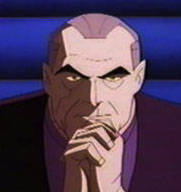 f
Batman Beyond is to be taken seriously as a legitimate chapter in
Bat history, it must prove that it can contribute something to Batman’s
character that no other chapter in his life can. What BB can contribute
is the permanent restoration of Bruce Wayne’s good name.
f
Batman Beyond is to be taken seriously as a legitimate chapter in
Bat history, it must prove that it can contribute something to Batman’s
character that no other chapter in his life can. What BB can contribute
is the permanent restoration of Bruce Wayne’s good name.
Let us say the title returns to production someday. The heart of the show has always been the unique relationship between Terry and Wayne. These are the only characters who know why Terry’s father died, the only ones who know Terry’s real reason for becoming Batman. This murder prompted both men to re-examine their lives, to and decide they didn’t like what they see.
Wayne’s determination to redeem himself begins by redeeming himself in Terry’s eyes. Terry’s father was murdered by company men. Technically it wasn’t Wayne’s company anymore; the corporate culture was unrecognizable and Wayne had no power to influence it, except by appealing to conscience. Still, he owns stock in the place and his name is on the door. He probably feels responsible for this murder, even though he knew nothing and there was nothing he could have done.
Terry for his part has taken Wayne and put him in place of his own dead father. Terry the ex-convict needs to redeem himself too. Cleaning up the company was each man’s way of proving to the other, "I’ve changed. I don’t want to be that man anymore. I need you to believe in me."
It has long been this writer’s contention that Wayne would have adopted Terry if the series had continued. Wayne would have done this, not to turn BB into one long therapy session, but because the Batman demonstrates his feelings with actions, not words.
This proposal develops Terry too. To become Batman Terry had to choose between his living parent (Mary) and his dead one (Warren). An adoption would make Terry’s choice much more clear, and would probably make it irreversible.
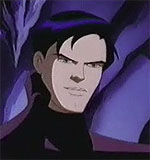 If
Wayne does adopt his protégé, Mary and Matt will surely
see it as a betrayal. ("You don’t love Dad anymore.") This
is the farthest thing from Terry’s intentions – but he can never
tell them. Terry did not become Batman, and would not set aside the McGinnis
name to betray his father’s memory but to honor it. Breaking Mary
and Matt’s heart is the necessary price to be paid. It would be the
first, indeed the only sacrifice Terry has been asked to make, and would
give all parties the character development they were denied.
If
Wayne does adopt his protégé, Mary and Matt will surely
see it as a betrayal. ("You don’t love Dad anymore.") This
is the farthest thing from Terry’s intentions – but he can never
tell them. Terry did not become Batman, and would not set aside the McGinnis
name to betray his father’s memory but to honor it. Breaking Mary
and Matt’s heart is the necessary price to be paid. It would be the
first, indeed the only sacrifice Terry has been asked to make, and would
give all parties the character development they were denied.
Terry wants to honor his father, and Old Man Wayne wants even one of his sons to forgive him and rebuild his family before he dies. The problem is, no one will let them. The moment I mentioned adoption, Wertham’s ghost reappeared:
Won't everyone sit up and wonder why this old bachelor billionaire (never married) is adopting his pretty young adolescent assistant? Cursory digging will reveal that most of Terry's jobs occur at night, and do not involve any visible errand running.
The Bat mythos has its Hugo Stranges and Ian Peeks in fiction and its Fredric Werthams in life. Running from them in fright has not worked, not once in all these years. Batman has let fear rule its life, and it is no better off for it. But fear is as much a choice as a motivation.
As we were cautioned at the start, anyone can say anything. A story needn’t be fair or true to get into circulation. Will tabloid reporters or Wayne’s corporate enemies invent prurient stories about Our Heroes for fun and profit? Of course they will. Indeed, they would be more likely to do so as the years roll by and no adoption takes place. The only variable under the Batmen’s control is how to respond to this threat. The Bat mythos should not attempt to placate its critics but should instead deny them any shred of credibility. It’s high time to cut the Gordian knot and try the direct approach for a change.
The direct approach asks, What does Terry do at night? Answer : he works. The sun never sets on the Wayne corporate empire. If Wayne tells outsiders that they are conducting legitimate business with offices in other time zones, and can prove it, then that’s the end of it. Surely Wayne anticipated this question from the start and has instructed Terry accordingly.
The direct approach does its homework. The truth is there are not and never were any X-rated possibilities in adopting Terry. The adult adoption laws are designed to prevent that kind of nightmare scenario. It is true there have been specific cases in which a petitioner tried to adopt a homosexual partner in a desperate, last-resort attempt to create some kind of legally recognized bond between them. All such cases have been thrown out. Adoption solidifies a parent-and-child relationship, and sexual feelings or sexual contact are obviously unacceptable in that context. Therefore if Wayne adopts Terry this will prove they are not a sexually active couple; but if Wayne declines to adopt, the rumors may begin that they are.
Finally, the direct approach calls witnesses. Wertham accused the Batman of having sexual relations with minors. Commissioner James Gordon’s actions plainly refute this allegation. Jim Gordon personally arranged Dick Grayson’s placement at Wayne Manor ("Robin's Reckoning").It’s an unmistakable endorsement of Bruce Wayne’s good character. It’s also pretty unmistakable that if Bruce had been a child molester, Jim Gordon would have shot him by now. So it seems the reputations of all are quite safe.
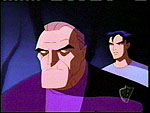 The
risks of adoption are real, but manageable. In contrast the risks of the
indirect approach are real but unmanageable.
The
risks of adoption are real, but manageable. In contrast the risks of the
indirect approach are real but unmanageable.
The indirect approach assumes that Wayne and Terry are in danger of being labelled a homosexual couple and that the best way to prevent this identification … is to behave like such a couple. That is, Terry cannot move in with Bruce Wayne even if the move would be in the best interests of both men; Wayne should hide his true feelings for his heir, and after his death slip Terry palimony under the table, laundered through trusted advisors or friends, rather than a direct and public inheritance. Keeping Terry’s inheritance quiet, though, could be construed as though the characters had done something wrong. Now if that’s how the characters act, that’s what people will think.
Remember perversion staining backwards? If Old Man Wayne is accused of having a same-sex affair with one boy, public perception would assume that that’s what he’s always done. Suddenly the father of orphans becomes the son of perdition. He didn’t give poor Dick and Tim a home out of compassion or to set an example for other prospective foster parents. He did it to molest them. Furthermore, Dick and Tim do more to promote this charge than Terry McGinnis ever could. Supposedly Dick moved into Wayne Manor at age nine (comics version) to eleven (B:TAS) and Tim at age thirteen (TNBA). Both left in a state of extreme mental anguish. Tim went insane. He moved out but still needs therapy forty years later. As for Dick, he fled the country! (Went to South America, according to the comics.) Despite their ages these characters didn’t move out so much as run away from home.
Dick and Tim call Bruce a freak and a
manipulator. They blame him for stealing their childhood. Metaphorically
speaking, they spit on the ground when his name is mentioned. They left
decades ago and nothing can induce them to make the first move toward
him. They aren’t there for him. Some villain or other is always trying
to assassinate him (Shriek, Blight, Payback, the Royal Flush Gang, the
ROTJ Jokerz, their Joker master), but no one ever checks to see
if the old man is dead or alive. Maybe they missed the first newscast
– but after the fifth attempt, you have to conclude they’re
not coming.
That is what the public will see. It needn’t be true. It need only be believed.
But if Wayne does adopt Terry, public perception would conclude that this is what Wayne has always done or tried to do. Bruce Wayne remains the protector of widows and orphans, and if his troubled sons ran away from home, well, it was because they were troubled. That’s why they were in foster care in the first place.
Now this may overcompensate the Batman – it makes him look more the saint than he is – but the alter-ego Bruce Wayne needs that to bleach away the stain upon his name. The Bruce of public image always maintained a warm-hearted, generous but occasionally naïve persona that bore little relation to his grim night life. What motivates both personas, though, is love of justice. Giving Bruce back his good name is not giving him more than he deserves, but merely returning what was stolen from him.
Ultimately, though, Old Man Wayne would not adopt Terry to simplify the distribution of his estate or to exorcize old ghosts (though this would solve both problems). If Wayne and Terry ever did this, it would be because this is the way they truly feel.